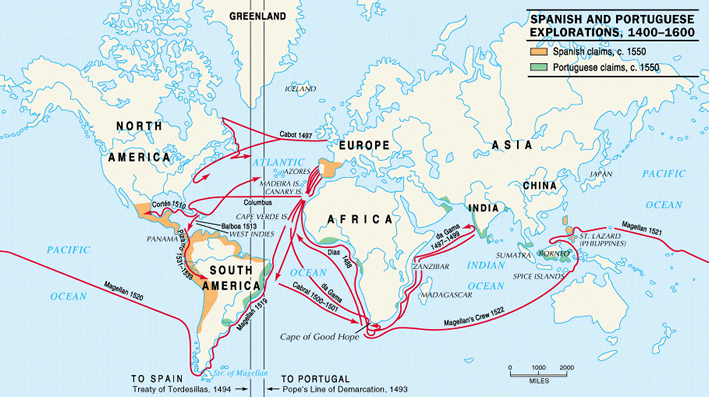The Portuguese were the fist to develop ships fit to travel the harsh currents of west-bound winds and be able to venture outward. While the Spanish stumbled into the Americas treasures accidentally in search of a new trade route to the indies where commerce and trade was highly profitable. Yet found the Americas and went on to colonization when the discovery of a new land was realized. Started immediately into colonization and exploiting everything the Americas had to offer.The Portuguese and the Spanish both shared one major goal: wealth. That they acquired with settlement in the Americas, due to rich soil, profitable metals(gold, silver etc) and a blank canvas; however not so blank. Natives/"Indians" (Due to mix up between trade routes) spread throughout the land, that proved a nuisance to incoming settlers that wanted to claim the land for the self's. Colonization did not serve to be such a problem due to the drop of population of natives caused by disease (small pox, measles, syphilis) brought by the Spanish and settlers, thus natives were earlier to control. Yet this did not stop revolts amoungst natives, yet unfortunately were unsuccessful, but brought better treatment from settlers. Apart from treatment the Portuguese and Spanish also had trade in common. Well the mainly Portugal who traded spices, gold and sugar cane, which made up most of their profit with the prosperity of sugar plantations. While the Spanish mainly relied on slavery from the natives allowed via the encomienda system. Which allowed the right to demand tribute and forced labor from the Indian inhabitants of an area and put the spanish on a golden pedistle about saving natives from there savage lifestyle and beliefs; however Bartolome de Las Casas (1474-1566). Who spoke against the church (saying alot due to priest status) and the Spanish actions in the natives in the Americas. As well as giving the voiceless a voice, he provided the world a written report of time, which was hard to come by at the time period.
As the Portuguese and Spanish conquered the Americas and underwent rapid colonization the Treaty of Tortillas was developed. Which divided the Americas by the catholic church; west of the land to the Portuguese and north of the land to the Spanish. While this evaded conflicts between the Portuguese and Spanish it brought no consideration to natives whose say deserved no needed to be heard and considered. However among st these tragedies the triangle trade took birth into a more elaborated triangle trade wholes wing span expanded the whole world. Into an essential part of the economy thriving the profits and the value of the Americas and building the bones of a future World power on the bones of natives and there traditions. These trade networks mirror those used today, as well as our diets connect the the resources brought over from the Old world to the New; as well as religion of these times still influencing our modern day world and societies. Thus illustrating the impact of the Portuguese and the Spanish on the Americas and the Modern day world.
Spanish and Portuguese Expatiation 1400-1600
Spanish Impact of the Americas

No comments:
Post a Comment